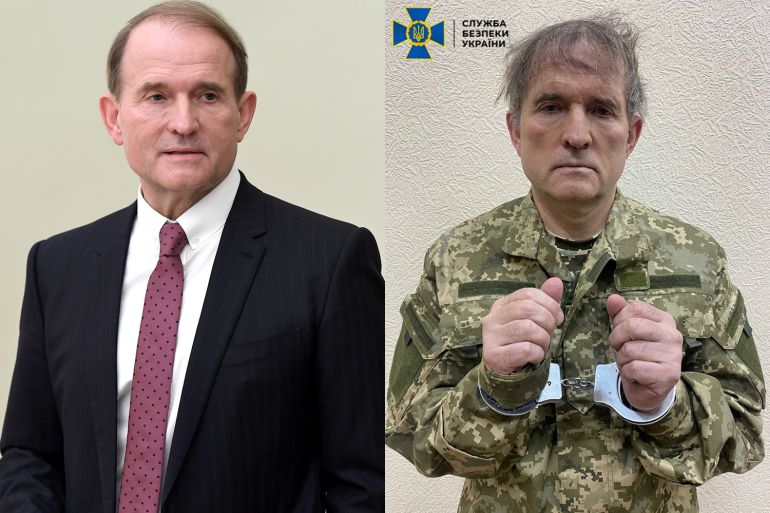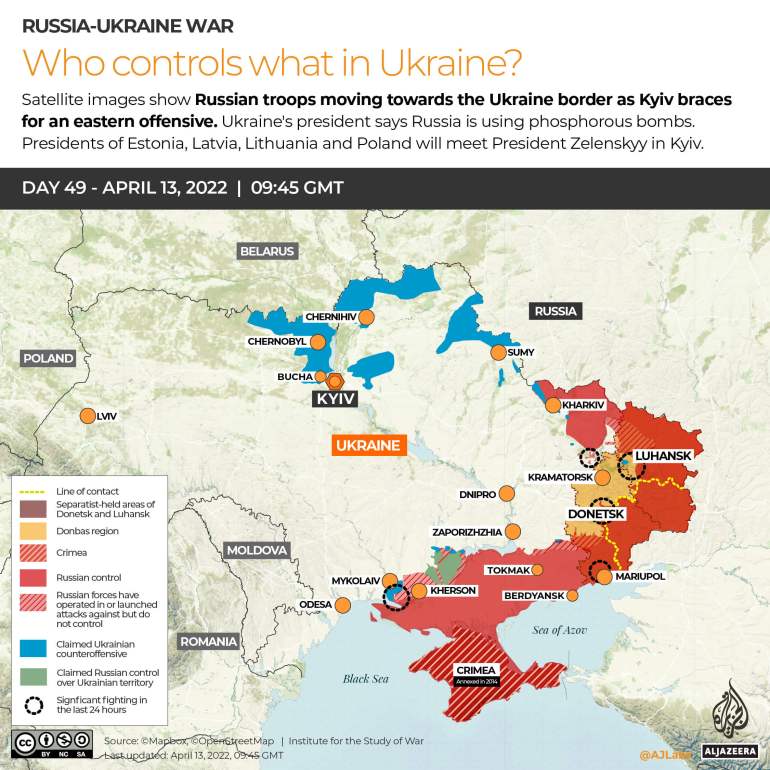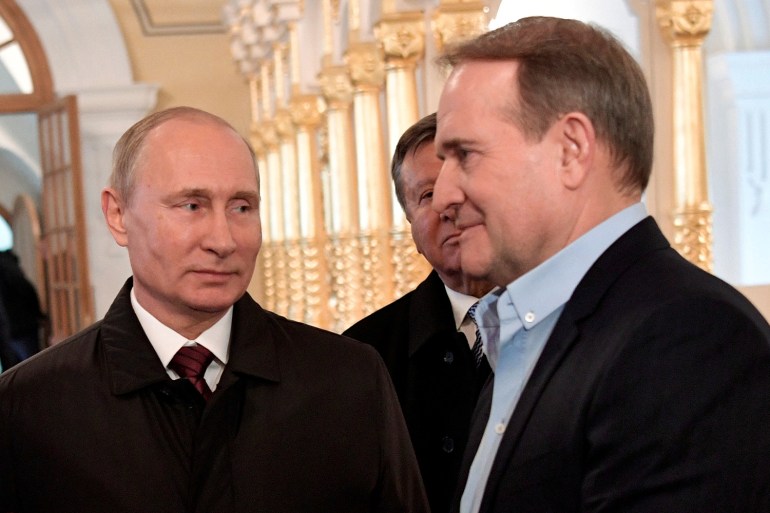Who is Viktor Medvedchuk, Putin’s main man in Ukraine?
Medvedchuk was recently captured by Ukrainian forces having fled house arrest soon after the war began.

Vinnytsia, Ukraine – Last May, 67-year-old Viktor Medvedchuk, a Ukrainian politician close to Russian President Vladimir Putin, was charged with treason in Kyiv, accused of selling military secrets to Russia and looting natural resources in annexed Crimea.
He was placed under house arrest and Putin immediately accused Kyiv of “purging the political field of all the forces that stand for a peaceful resolution” of the Russia-Ukraine crisis.
Keep reading
list of 3 itemsWhy did Ukraine suspend 11 ‘pro-Russia’ parties?
Kyiv says it captured Ukrainian pro-Russia politician
“So, everyone who works with Russia in Ukraine will be held responsible?” said Putin, who is godfather to Medvedchuk’s daughter.
On February 28 this year, four days after Russia invaded Ukraine, Medvedchuk fled his house arrest.
His unimpeded escape was seen as a sign of weakness of Ukrainian President Volodymyr Zelenskyy’s government amid the chaos and uncertainty of the war’s first days.
But Ukrainian forces thwarted Putin’s blitzkrieg – and intelligence service kept looking for Medvedchuk, whose pro-Russia political party, Eurosceptic Opposition Platform – For Life, suspended operations a month after his escape.

On Tuesday, Zelenskyy announced in a Twitter post that Medvedchuk had been apprehended after a “lightning-speed operation” by Ukraine’s Security Service.
The post included a photo of the handcuffed Medvedchuk, looking pallid and dishevelled in a badly fitting military uniform; in the past, he was often seen in bespoke suits and with a smile on his face.
Medvedchuk’s transformation from Putin’s right-hand man into a fugitive became a perfect counterpoint of Ukraine’s political and ideological metamorphosis.
Pro-Moscow and pro-Western political forces had polarised the ex-Soviet nation of 43 million, where a third of the population still speaks Russian at home. The lack of unity in the halls of power hobbled reforms, bred corruption, and made Medvedchuk the most powerful conduit of Moscow’s influence.
From lawyer to Putin’s man in Ukraine
A Soviet-era lawyer criticised for poor defence of Ukrainian dissidents in the 1980s, Medvedchuk entered politics a decade later after joining and then heading a pro-Moscow socialist party.
In the early 2000s, he headed the administration of Leonid Kuchma, a pro-Russia president – and developed the image of a taciturn “grey cardinal”.
He met Putin for the first time in 2003 and, a year later, the Russian president baptised his youngest daughter Darya in a St Petersburg cathedral.
Medvedchuk then managed the election campaign of Victor Yanukovych, a fiercely pro-Moscow presidential candidate.
Yanukovych’s victory in the 2004 vote sparked the Orange Revolution, Ukraine’s first pro-Western revolt, whose organisers accused Medvedchuk of rigging the vote.
It was also dubbed the “battle of three Victors,” because Yanukovych’s main rival was Viktor Yushchenko, whose face was disfigured after what he said was a Kremlin-orchestrated poisoning with dioxin.

The anti-Russian Viktor’s subsequent victory in a repeat runoff election marked Medvedchuk’s temporary downfall from the political Olympus. He failed to be re-elected as a lawmaker, and his political party polled dismally.
But he started putting together a media empire that would eventually include three television networks and a string of publications.
Medvedchuk’s former protege Yanukovych won the 2010 presidential vote, but Medvedchuk was largely sidelined.
He remained Putin’s main man and regained influence after Yanukovych was overthrown in 2014 by Ukraine’s second pro-Western revolt, known as the Revolution of Dignity.
Medvedchuk bankrolled Opposition Platform – For Life, the largest pro-Russian party, which fielded a candidate in the 2018 presidential vote.
He visited the Kremlin to promote the candidate, Yuri Boyko, triggering a political storm in Ukraine. But Boyko came fourth, and Zelenskyy won with a staggering 73 percent.
In a parliamentary election a year later, Medvedchuk’s party won 44 seats in the 450-seat Verkhovna Rada, Ukraine’s lower house of parliament, becoming the largest faction opposed to Zelenskyy’s Public Servant party.
Medvedchuk’s party resisted Ukraine’s “de-communisation” efforts to remove Soviet-era monuments and symbols, and opposed the “language law” that curbed the use of Russian in mass media and public life.
Medvedchuk boosted the party’s media presence through his television networks, which refrained from directly praising the Kremlin.
But their anchors often described Kyiv’s conflict with Russia-backed separatists as a “civil war”, said that Crimea’s population supported the 2014 annexation, and called for the restoration of trade with Moscow.
The party also paid for stories in other outlets, a media monitor claimed in 2018. Medvedchuk “commissioned” about a third of online media reports that contained strong signs of bias, the Institute of Mass Information alleged.
He and his closest allies were sanctioned in 2021 by Zelenskyy, who also froze their assets and closed down his TV networks.
If tried and convicted, Medvedchuk faces up to 15 years in jail. However, Zelenskyy said he would prefer to swap him for Ukrainian prisoners of war.
“I propose to the Russian Federation to exchange this guy of yours for our boys and our girls who are now in Russian captivity,” Zelenskyy said in a video address, posted on Telegram.